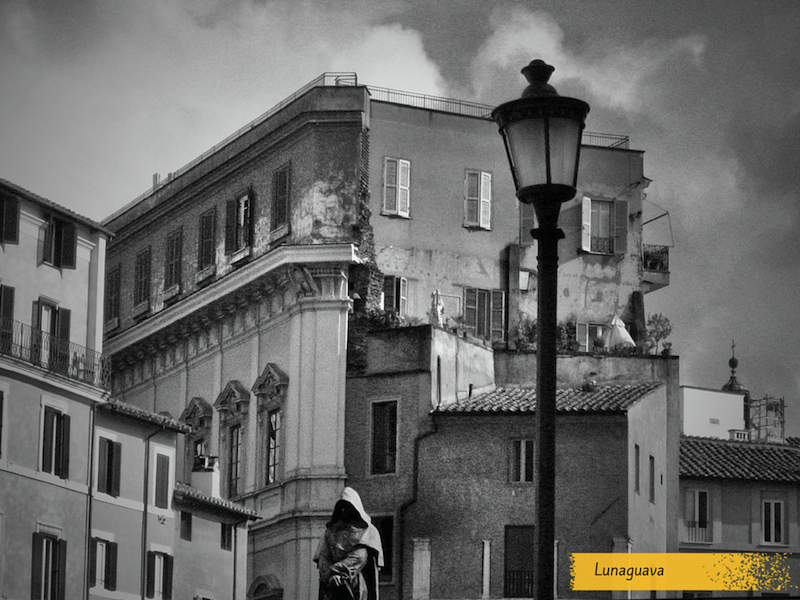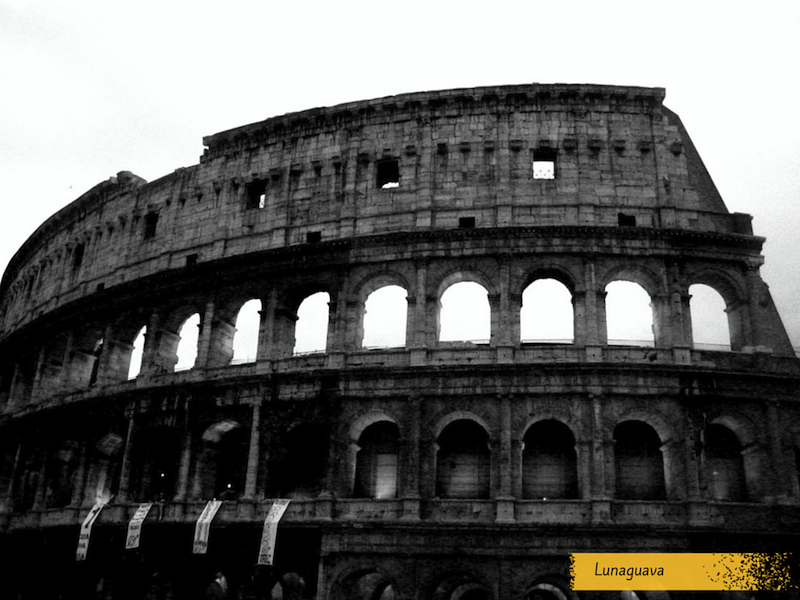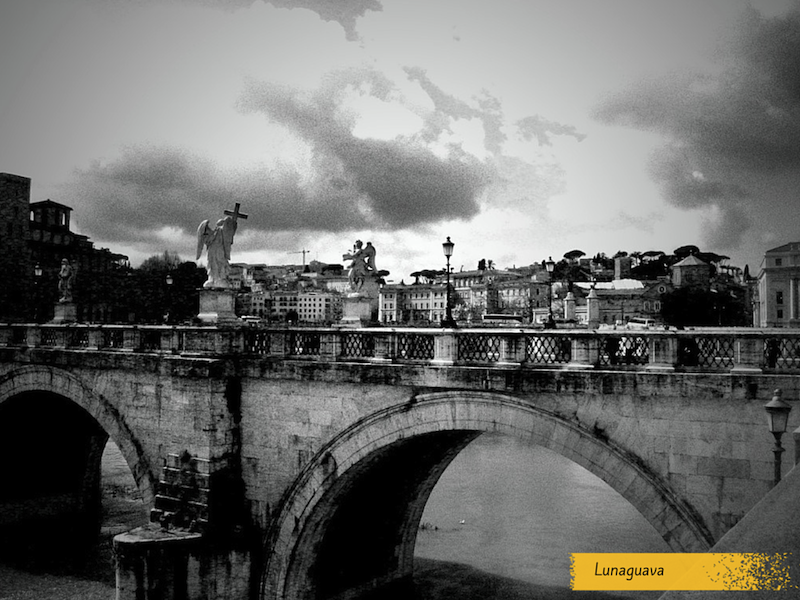Stories Set in Rome
“Would you tell me all the stories from when you were young?”
This was the question I was being asked by a little girl wearing a blue summer dress and proudly clutching a brown leather purse, its size mirroring the minuteness of her hands. She had been circling my pockmarked bench for a few minutes, pretending not to be bored. Her red shoes lifted dust here and there, kicked pebbles against a battered yellow wall and managed to never stop moving, continuously sending brief twinkles of sunshine to the glass lenses perched atop my nose.
I had seen her before, leaving the new apartment at the end of the street, hopping from one corner to the other like a nervous rabbit trying to decide between a twig and a carrot. Although I had noticed her noticing me on previous occasions, we had both reached a tacit agreement of non-engagement. At least, that’s what I kept telling myself. As I lifted a splinter of wood from my bench, she finally approached me and blurted out her question. She did it in that childish tone which is equally sheepish and condescending, usually found in either street urchins with nothing to lose or snotty snobs unaware of a world outside their pillows.
I looked at her and straightened my back against the wall, cracking the bench’s ligneous legs against the cobblestones underneath. She stared back at me, unrelenting in her youth. How can one argue with those who have yet to discover the evanescence of time? This is what I thought, although all she heard was a sigh infused with a not-entirely-slight weariness.
“I’ll tell you one,” I said. Her feet sunk quickly to the ground while she nodded and smiled. Brief, her smile was, and more businesslike than delighted. “But you must choose the setting,” I continued, “since I have lived in many lands. Where will this story take place?”
As her fingers wrapped around her purse, she stuck a sliver of pink tongue out, pensive. “What about here? Tell me a story set in Rome.”
“Fine,” I said. “Will you be standing there the whole time?”
“Will it be a long story?” she asked.
“Do you want a long story?” I replied, feeling the years flow through my veins.
“I want… no, I would like a compendious story,” she said with teeth flashing.
“My, a compendious story… Who taught you that word?”
“What, story?”
She guffawed and sent her dress swirling. I waited for her tiny convulsions to subside, letting myself drift to a different time, when the sun spread along a land laden with the smell of green vines and tender apples.
As soon as she had her eyes open I spoke: “No, compendious.”
Lifting a small tear from her eyelids she said: “Mommy taught me. She teaches Classics. She knows some great stories.”
“I bet she does.”
“But I want one of yours now.”
“Fine, fine. A story set in Rome, then; apologies, a compendious story set in Rome.”
This is what I told the little girl in the blue summer dress:
Once, when I was young and sitting outside a small trattoria on a thin road by the Portico d’Ottavia, I met a cat named Cleo. Her fur was thin and white, with a blotch of tarry black covering half of her neck. At first, since she kept sliding along my trousers and was leaving fur everywhere, I pushed her away (gently though – don’t give me that look). After a short game of cat and pants, she sat down by the side of my table, straight as a hieroglyph.
Seeing her stare at me in such a regal manner tickled my charitable bone, so I threw her one of my fried artichokes. Carciofi alla giudìa is their Italian name. Do you know what those are? They are a Jewish Roman delicacy I had learned to love throughout my years dancing on the slippery streets of Rome. Delicious – you should ask your mommy for one these days… No? Your loss, signorina. Anyway, the cat (whose name I was yet to know at that particular moment) moved her eyes ever so slightly towards the fried artichoke, gave a light sniff and kept looking straight at me. I’ll admit I was a bit taken aback by her attitude. Plus, I had just lost a very delectable piece of artichoke, which did not leave me in the most sympathetic of moods. We stared at each other for a while, me gradually lifting my right eyebrow and she resolute in her impassiveness. Just as I was about to admit defeat and return to my remaining fried artichokes, she spoke. Yes, spoke. Like you and me are speaking. Well, mostly me now, but you get my point.
She spoke like a human – like us – but with a soft roll of the tongue, which for a lack of a better word I’ll describe as feline. Although perfectly understandable, her sentences seemed purred rather than uttered. It sort of makes sense, doesn’t it? As you’ll understand, I was shocked to hear a cat talking to me. But she did, and this is what she told me: “I would like to trade for it.” I gaped at her, letting a fried artichoke slide from my fingers back into my plate, where it made a surprisingly neat splash.
Glancing quickly around me, I tried to ascertain the presence of prying eyes and hears. My street was deserted, only made animated by the echoes of scooters zipping far away through the open city. Inside the trattoria, where I was the sole costumer, the owner was dozing off, resting his elbows on top of a counter washed in shades of grey and brown. I then turned to the cat.
“Trade what for what?” I asked, letting my voice fall to a near whisper.
“I’ll trade you a story for the fried artichoke,” the cat replied.
“Why would you want to trade something I’ve already given you?” I asked again.
“Because I am a cat by nature and a trader by nurture, a daughter of merchants and granddaughter of tale keepers” she asserted in all seriousness.
I scratched my left jaw with the tip of my thumb, swiveling my chin upwards as I let her words fill my mind with the slow speed of an autumn fog. “A trade, you say?” I wondered aloud. She gave a slight nod of her head. “Fine, what will you give me for my fried artichoke?”
“I will tell you a story for each artichoke you give me,” she said.
“Each artichoke? I’ve only given you one!” I shouted while whispering.
“I would like to have five fried artichokes, please,” she insisted.
“Five? But I’m down to my last seven!” said I, still famished.
“I would still like to have five fried artichokes, please,” said she, resolutely polite.
Well, she did have some nerve, I’ll tell you… but by now I was also getting curious, and my curiosity is usually even more ravenous than my belly. So I looked at her, then looked at my plate, and ultimately agreed to her terms. I didn’t tell her this, though. First I wanted to see how she would perform. Only fair, don’t you think, signorina?
“I’ve already given you one artichoke. If you tell me a story, and I enjoy your story, then we’ll have a deal”, I pronounced, my voice swelling magnanimous.
“Very well”, she said.
I made myself as comfortable as I could and eased my hears into her purring voice. Her story went like this:
There was a cat living in Rome named Marozia. She was wild and loved the smell of dew. She was also the lover of a cat named Pavese, whose tail had been stolen by the owner of a pawn shop called Monte di Pietà. How Pavese lost the property of his tail was never discovered, and he never discussed it, but the fact was he no longer owned it. As such, his nightly activities were much derailed and curtailed, not only because his balance was now impaired by a debited tail but also due to the constant teasing he received from all the other cats. Marozia felt saddened by this state of affairs: she enjoyed his company when watching the moon and the starry bonfires above but couldn’t help notice his melancholic poise. One evening, when the owner of the pawn shop shouted “Don’t forget your tail is mine!” to Pavese as he left for an evening stroll by the Via della Greca, Marozia decided to avenge her lover and get his tail back.
Here she stopped (Cleo, I mean) and slowly stretched her right paw, pulling the artichoke on the floor towards her, nibbling quickly once she had it within reach. I waited for her to finish eating and continue her story, but as soon as she gulped the last piece of artichoke she asked for another one.
“First you have to finish the story,” I said.
“My story is finished,” she replied.
“How do you mean? Your story had no ending; I’m not even sure it had a middle!”
“The story had an ending – when I stopped telling it, it ended. That’s how all stories work.”
“You’re being silly. I, on the other hand, am being even more so by talking to a cat in the middle of the street – and not just a cat, but a cat who is unable to tell a proper story!”
At this point it was approaching midday. The sun shone stronger, spreading light and laziness throughout the corners of Rome, muffling all steps and distant blue mopeds. All around us was the silent sound of summer, suffused with the smell of rough stone and olive oil. But my legs were getting restless, and I would have walked out of my little trattoria table if I wasn’t suddenly reminded of my unique situation: as a young man listening to a talking cat, I currently found myself part of a world whose existence I knew nothing about.
Staring at the furry creature licking her paws, I saw Rome change into a dream tinged in violet hues. Do you know the word “woolgathering”, signorina? Well, that was what I was doing. Anyway, I glanced at the serene-looking cat and decided to hear more of her stories – even if they turned out to be as frustrating as the first one. I threw her another fried artichoke and waited for her to begin. Her next story went like this:
There was a cat living in Rome named Tamara. Daytime usually found her in Trastevere, circling the hallowed grounds of the Tempiettto. Upon the sun-soaked walls surrounding San Pietro, in Montorio, she sharpened her claws, leaving grey scars upon cement, patiently preparing for the evening’s regular assembly. This gathering, which she had attended since her mother had dragged her by the neck as a kitten, took her away from the river Tiber and into the headlighted phantasms continuously honking around the crumbling Colosseum.
As nighttime arrived, Tamara hurried through streets empty of gladiators, her presence noted only by the moon. Meanwhile, the other feline members of the assembly converged into the inscrutable ruins of the Roman Forum, jumping fences and squeezing through metal holes, until everyone sat boisterous by the Temple of Saturn, where Tamara, already perched between columns, lifted a paw to the heavens and finally made quiet reign.
As soon as the frenzy ceased, a black paw rose from the audience, requesting attention. Tamara looked down and recognized the checkered mantle of Marozia, camouflaged between the forest of cats. Following Tamara’s assent, Marozia spoke: “A lover of mine has had his tail stolen by humans. I wish to return it to its rightful owner.” To this entreaty the cats responded in indignant mumbles, demanding reparation and restitution. Up above, Tamara stood silent and gazed at her crowd, giving it time to hush. When they eventually did so, she asked Marozia if her lover’s tail was kept in a secret location. “Of course it is” replied Marozia, “or else we would have already taken it.”
Under the gaze of all cats present, Tamara jumped to the grass below, past Marozia and into the gravel floor, heading towards the Arch of Septimius Severus. Shortly afterwards, she stopped by a small shadowed square surrounded by a metal railing. Enclosed was a collection of broken limestone slabs, dark and dusty. Careful not to step on them, Tamara stretched a moon-clad claw and made the tiniest of scars on the limestone. She then waited for the wind to rise. When it did, not five heartbeats later, she examined the scar she had made and saw it had changed into an inscription. This inscription, which was quickly fading, read only one word: iudicium.
Satisfied, Tamara returned to the Temple of Saturn. Settled once more between the ancient columns, she gazed at the Vittoriano, looking like an enormous wedding cake in the distance. Finally, turning her whiskers downwards, she told her anxious companions they would be getting Pavese’s tail back.
“Are you done with this one?” I asked when Cleo had remained silent after that last sentence.
“Yes, that’s the end of my story,” she replied.
According to the rules of the game, I threw her my third artichoke. Again she pulled it towards her, eating with graceful relish. Her next story went like this:
There was a cat living in Rome named Despina. Her playground stretched from the Piazza Barberini all the way to the Villa Borghese and back to the Piazza Colonna. Either hunting for scraps along the Via Veneto or licking gelato splashed on the cobblestones around the Trevi Fountain, Despina never went a day without thinking of Rome as an enormous buffet, ready to satisfy not only her stomach but also her senses.
One morning, feeling trapped inside her geographical routine, she decided to venture out into the shadows of Piazza della Rotonda. Upon reaching her destination, droplets of rain began to splatter around her. Trying to find cover, she soon arrived at the Pantheon, where she licked herself dry while watching raindrops trickle through a circular hole in the ceiling.
The sound of water falling made her hungry. Letting her tail drop carefully on top of her front paws, she thought of gastronomical possibilities. Rome had no shortage of delicacies, and Despina knew where to obtain her share. But she found herself in a new neighborhood, away from the familiar smells of Via del Tritone and other usual hangouts. Lost in dreams of penne all’arrabbiata, she forgot all about the rain still pouring outside, until the wet whiskers of another cat came dripping into her line of vision. “Tamara!” said Despina, unable to hide her surprise. “Hello, Despina,” said Tamara, approaching slowly until she settled by Despina’s side. Looking straight ahead, Tamara let her silence breathe for a few seconds. Despina, anxious, turned her head and asked if something was wrong.
“Nothing is wrong… apart from everything,” said Tamara. “I didn’t see you at our last gathering, Despina. Are you well?”
“Yes, yes, I am well,” replied Despina, “but busy, very busy. What a week this has been!”
Tamara smiled and continued: “I consulted with the sacred Lapis Niger. We must bring justice to one of our own who has had his tail stolen.”
“Stolen?” gasped Despina. “How very rude! Why would anyone do something like that?”
“Magic,” said Tamara. “A cat’s tail is a common ingredient in old black magic recipes.”
“So the tail has been cooked?” asked Despina, imagining a cauldron smelling of sulfurous fur.
“No, the tail is merely hidden. Some magic needs only something precious to be taken, particularly in the human world. Even more so if gods are involved.”
“So the tail was stolen by a human?”
“Yes,” replied Tamara, who then looked straight into Despina’s mismatched eyes, glowing in green and blue. “In order to get it back, I need you to do something for me.”
“Anything,” said Despina, raising her head higher and flicking her ears. “What do you need?”
Tamara spoke with the unwavering voice of a thousand cats: “I need you to die.”
Although my fourth artichoke was already limping in the air, I kept waiting for the story to continue. But Cleo remained mute, giving me her now typically inscrutable look. I’ll admit I didn’t care much for the death or life of a stray cat in the streets of Rome, and I had little patience for magic or any such nonsense. Yes, I know this sounds a bit strange coming from a man who had just been listening to a talking cat, but my mind was still trying to catch up with my ears. By this time, I had no intention of further interrupting Cleo, but merely wanted to keep my side of the bargain and get on with my day. Hence, I threw her the next oily treat and waited for the tale to continue. Her next story went like this:
There was a cat living in Rome named Melania. Her fur was pure white and her eyes pitch black. No other feline walking the streets of the eternal city had been blessed with such gracefulness – she seemed to be made of sea breeze and moonlight, an alien floating amidst alley cats. She was also the most elusive of Rome’s inhabitants. Whenever she wanted to be found, her shadow could be seen drifting between the Piazza del Popolo and the Fontana della Barcaccia, in the Piazza di Spagna. It was there, as she sat invisible from the human crowds on their way to the Spanish Steps, that Melania waited for Despina to appear.
Swiftly evading the clumsy footsteps of the many tourists swarming the Piazza di Spagna, Despina arrived as the sun began to set. “Tamara sent me,” she said, moving near Melania.
“I know,” said Melania. “Do you know what you must do?”
“Yes,” replied Despina. “I am ready.”
“Very well,” said Melania. “See that building on the right side of the steps? We must reach its second floor, go inside and take a small piece of cement. All the walls were scrapped many years ago, but I know where they missed a spot.”
“Inside? But won’t the humans notice us and shoo us away?” asked Despina.
Melania stretched one of her immaculate claws and scratched her belly until she produced a tiny speck of fur, which she then blew in Despina’s face. “They won’t notice you now,” she said, starting to walk. “Come, we need to be in the graveyard by midnight.”
Later that evening, Melania and Despina visited the Testaccio neighborhood. They went past the Pyramid of Gaius Cestius and into the old Protestant cemetery, where they finally encountered the flowers adorning the grave of a young English poet. Beside it stood Marozia and Tamara, cloaked in darkness but with eyes ablaze. Following silent greetings between all four cats, Melania spat a piece of wet cement unto the poet’s tombstone. After mixing goo and grit with her claws, she told Despina to rub her paws against it. Once Despina had done so, Melania said this: “Go to that myrtle bush and uproot it. Your paws are now enchanted, so you will be stronger. When you succeed, blood will flow from the ground. You must drink it in order to proceed with your journey.”
Despina did as ordered, uprooting the myrtle shrub and drinking the blood filling the holes left open by the naked roots. Soon she felt lightheaded, and moments later fell dead.
Melania and Marozia then helped Despina’s lifeless body into the muscular back of Tamara. Moments later, they became a slow and peculiar procession on their way to the Baths of Caracalla, where they would later lay Despina by the statue of Asclepius, waiting for dawn and a new, animated ceremony.
At this point Cleo’s whiskers were glistening with grease. My own plate was splattered with olive oil, but I hadn’t touched my own share of fried artichokes in a while, so they were turning into a squishy pool of mush. Cleo didn’t seem to mind though. She quickly gulped the new one I threw her, as if she were getting hungrier with each offering. Or maybe she just wanted to complete her tale and go in search of another schmuck with a tastier meal. In any case, her next story went like this:
There was a cat living in Rome named Diomira. She was the last descendent of a distinguished lineage whose origins could be traced back to the founding of the city itself. It was said her ancestors had served Giordano Bruno (his hooded statue on the Campo dè Fiori market is a regular point of pilgrimage to many cats), but the most peculiar aspect of her heritage was one she kept to herself: centuries ago, a family member had witnessed the murder of its human friend in the Curia of the Theatre of Pompey. While various senators argued over the dead body, Diomira’s ancestor approached it, eventually crouching to lick the bloodied face of Julius Caesar. As soon as the cat tasted blood, the skies opened up and a bright blue beam shone upon its fur. Gazing from above, the gods had decided to reward the cat’s loyalty and affection towards its human companion. And so, from that moment onwards, Diomira’s family was given the gift of memory.
Diomira remembered this scene vividly, and could still taste Caesar’s blood in her mouth, just has her parents had done before her. But she also remembered a different Rome, or all the Romes that ever were. Her life was intimately connected to all the past lives of the city, which she felt flowing through her veins on every second of every day. She had no anxieties or fears, because she had seen all the variations of her story played out across centuries. Curiously, the pull of bygone eras had made Diomira a cat of the moment, of the immutable present. To her, the ruins of Rome did not elicit feelings of melancholy; on the contrary, she basked in the decrepitude of the glorious capital, recognizing each stone and speck of moss as a unique but fluid element of a fragile, beautiful world.
This was one of the reasons she enjoyed walking through the decaying arches of the Largo di Torre Argentina, surrounded by the countless other cats who called the sunken square home. Although used to the multicolored flurry of felines continuously crossing her path, one evening Diomira noticed a cat who seemed to be not only lost but also translucent. Intrigued, Diomira walked towards it. As she looked intently ahead, the apparition stopped on its tracks, returning Diomira’s gaze.
“Can you see me?” the apparition said, apparently surprised.
“Yes, I can. Are you a ghost?” asked Diomira.
“I don’t know, maybe. I only know I’m supposed to find a stolen cat’s tail, which could be anywhere in Rome.”
“Were humans responsible for this theft?” asked Diomira, used to the oddities of life.
“Yes,” replied the apparition, “although I don’t know where they hid it. I’ve been searching all over the city for hours, but I can’t find anything, not even a clue.”
Diomira sat down on a dilapidated wall, thinking of puzzles and oracles. “I know!” she finally said, rising suddenly. “We should go to the temple of Feronia. Humans have gone to her in search of wealth and abundance since ancient days. My family remembers many stories of offerings, sacrifices and dark dealings. Her temple is one of the last places in Rome where old magic still holds some sway. If the cat’s tail has been stolen by humans, the goddess Feronia should have it.”
Unsure of what was happening, the apparition nodded and followed Diomira along the dirt paths of the Largo di Torre Argentina. Circling around the crowd of cats lounging or playing in the darkened fields, they soon came upon the temple of Feronia. Although its timeworn stone had lost much of its luster, both cats immediately felt the energy of a primordial deity flowing around them.
“What should I do now?” asked the apparition, tensing its muscles.
“First, wash your face and paws,” said Diomira. “Then, you must clear your mind of everything apart from what you truly want.”
Feeling its tongue working steadily, the apparition imagined food and sunshine, but quickly focused on the quest at hand. After a few minutes, the temple’s stones became luminescent. All breeze stopped and all sounds were muted. Suddenly, the apparition felt a piercing pain in its ears and a voice booming inside its head. But it wasn’t really a voice – it was more like a sonic thought, going straight into the furthest corridors of the mind. This is what it said:
“Oh worshipper of my shrine,
what yearnings stoke your fire?
Oh devoted follower of mine,
what news of your desire?
Give me your body so I can feel
nimble as light and strong as steel;
Give me your eyes so I can see
green and blue as the endless sea;
Give me your voice so I can talk
sweet as honey and harsh as chalk;
Bring me your life and your request
– but not till death has made you her guest.”
Diomira watched as stone gleamed like stars and the whole square seemed to dissolve in white light. Her eyes remembered the days of yore when men and women would whisper words of praise by the temple, trying their best to draw good fortune unto themselves. Now she heard nothing but saw tiny sparkles dancing in the air, rising and falling around her whiskers, her fur soaring electric as if touched by the cosmos.
When the world eventually turned back to its earthly colors, Diomira found herself alone in the temple. No trace of gods, magic or ghosts was left. Only her memory of the events shone brightly in her mind. “I wonder if the tail was returned,” she thought as she walked towards Piazza Navona, greeting a new dawn.
Following a couple of minutes of silence, I asked Cleo if that was the end of her story. When she told me it was, I became slightly agitated, which I believe was perfectly understandable. “How can that be the end?” I asked. “What happened to Despina? And what about Marozia and Pavese? Did he get his tail back or not?”
Cleo stared at me, maddeningly serene. “If you like, I’ll trade you any other story for a fried artichoke.”
I looked at my plate, feeling dejected. A talking cat had just turned me into a fool, but I couldn’t imagine returning to my routine without hearing about the fate of Despina, Marozia and the other cats. “Fine,” I said at last. “I have two more artichokes. I’ll give you one for Despina and the other for Marozia.”
Cleo opened her mouth in a yawn. “Very well,” she said.
“Wait,” I interrupted, “first you’ll have to answer me one question: what is your name?”
“My name is Cleo,” she said.
“Thank you, Cleo” I said as I gave her my last two artichokes, defeated yet strangely satisfied. She then told me what had happened to Despina, Marozia and all the other cats.
“And what did she tell you?” asked the girl in the blue summer dress as I prepared to leave my bench.
“What would you trade for it?” I asked, getting up.
“Trade? I have nothing to trade,” she said, frowning.
“You have your dreams,” I said, cleaning my glasses with a smooth black cloth.
“But I never remember my dreams,” the girl in the blue summer dress said, exasperated. “Anyway, your story was not compendious at all!”
I put the cloth back in my pocket and the glasses atop my wrinkled nose. Turning to her and her beaming brown eyes, I smiled and said: “Neither are dreams, signorina – and neither are the stones of Rome.”







Pahahaha, got to love a sassy cat and its artichokes, whereever the setting may be!
Sara | This Girl Loves
Thanks, Sara! Good luck!
Love it! I visited Rome for the first time last summer and can just see all the cats (with their wonderful names!) padding silently about the cobbled city streets. Great to read something different to all the usual travel blogs about the most famous city in the world!
Thanks a lot, Heather! Glad you enjoyed it. Safe travels!
Nice, like your style.
Thanks James, good luck!
Brilliant blog. Rome is one of my favourite European cities, so it’s nice to read about it. Love your storytelling style.
Thanks, Anf. Glad you enjoyed the story and the city itself 🙂 Good luck!
Great story! It took me back to Rome and sitting at quaint sidewalk cafes. None with talking cats, but still… I loved your style with this!
Thanks a lot, Amy! Good luck!
Cheeky little girl! She certainly does know some big words…I never heard of them haha. You write so well, you should gather all your stories and make a book!
Thanks a lot, Samantha! Hope you guys are still enjoying the many wonders of Asia 🙂 Good luck!
Great story, well worth reading – also lovely, lovely pictures!
Thanks a lot, Sarah! Good luck!
Thanks for the very nice story
You’re welcome 🙂 Thank you for dropping by and good luck!